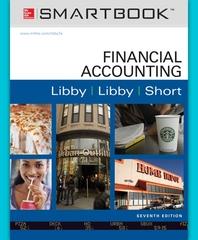Question
Suppose a business had assets totaling 20,000 and liabilities totaling 17,000. What was its owners equity? 3,000 10,000 20,000 37,000 2. A building, an item
Suppose a business had assets totaling 20,000 and liabilities totaling 17,000. What was its owners equity?
3,000
10,000
20,000
37,000
2.
A building, an item of equipment, and an automobile for a company that manufactures and sells clothes may all be examples of:
Current liabilities
Non-current assets
Current assets
Non-current liabilities
3.
An asset is classified as current if:
It can be sold in the near future
It can be converted into cash in the near future
It can be converted into cash within 2 years
It is not cash
4.
A three-year bank loan to be repaid at maturity is an example of:
Non-current asset
Current asset
Non-current liability
Current liability
5.
Which of the following statements is correct?
Investors and creditors are, among others, users of financial accounting.
Auditors are responsible for preparing the annual report.
Financial Accounting produces information for internal purposes only.
Only cash transactions should be recorded in the financial statements.
6.
For the remaining questions, please consider the following transactions that happened upon the incorporation of Berry Company by its owner, John Berry, during the first week of January:
It received 50,000 in cash from John Berry as capital.
It borrowed 30,000 from a local bank.
It purchased 15,000 of equipment for cash.
It purchased 20,000 of inventory on account.
It pre-paid 3,000 for the office rent and 2,000 for the insurance.
What is the cash balance at the end of the week?
50,000
40,000
80,000
60,000
7.
What are the total current assets at the end of the week?
90,000
75,000
80,000
85,000
8.
What are the total liabilities at the end of the week?
30,000
20,000
100,000
50,000
9.
What are the total assets at the end of the week?
80,000
50,000
15,000
100,000
10.
The following table shows the balance of certain accounts on the Holmes, Inc. balance sheet at the end of December 31 and the following three-day period. By December 31, the company had not yet started its primary operations. However, they had begun some minor activities:
Balances at the close of Cash Inventories Fixed Assets* A/P Bank Loan Sh. Equity
Dec, 31 11,000 14,000 15,000 5,000 8,000 27,000
Jan, 3 7,000 14,000 15,000 1,000 8,000 27,000
Jan, 4 12,000 14,000 15,000 1,000 13,000 27,000
Jan, 5 8,000 20,000 15,000 3,000 13,000 27,000
*Fixed assets is the same as non-current assets.
What activity took place on January 3?
They borrowed additional money from the bank.
They paid their suppliers.
They purchased more inventories.
They repaid the bank loan.
11.
What activity took place on January 4?
They paid their suppliers.
They repaid the bank loan.
They borrowed additional money from the bank.
They purchased more inventories.
12.
What activity took place on January 5?
They purchased more inventory.
They borrowed additional money from the bank.
They repaid the bank loan.
They paid their suppliers.
Step by Step Solution
There are 3 Steps involved in it
Step: 1

Get Instant Access to Expert-Tailored Solutions
See step-by-step solutions with expert insights and AI powered tools for academic success
Step: 2

Step: 3

Ace Your Homework with AI
Get the answers you need in no time with our AI-driven, step-by-step assistance
Get Started


